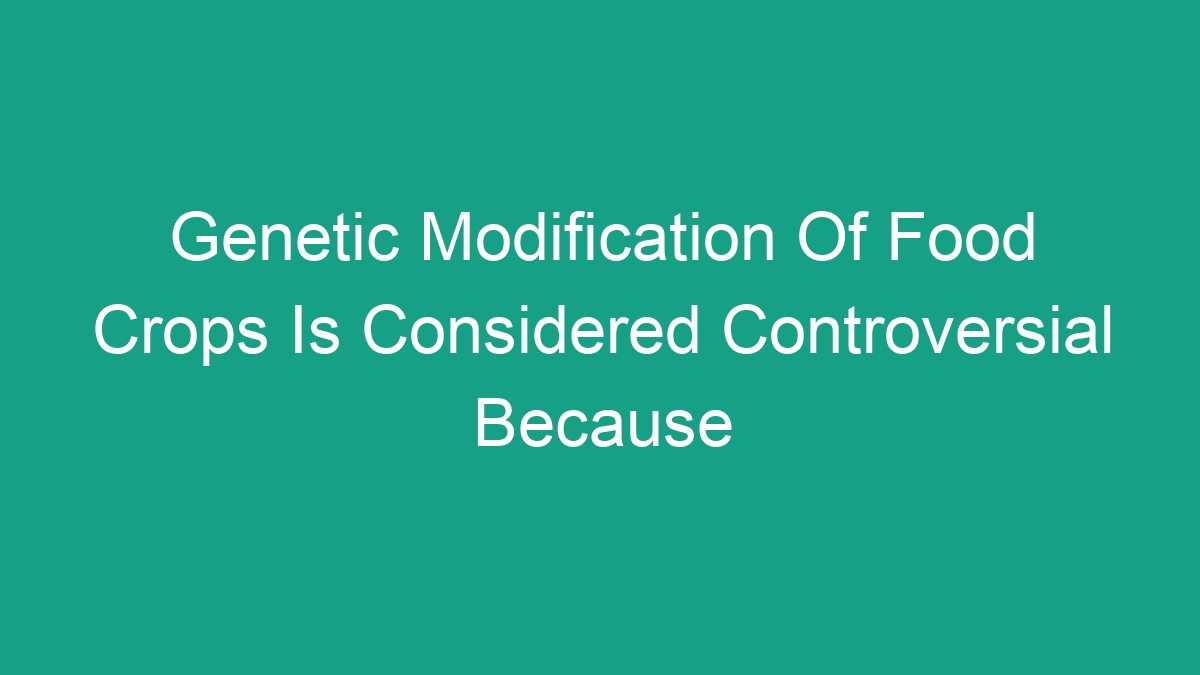
Introduction
Genetic modification of food crops has been a topic of significant controversy in recent years. This controversial issue has sparked heated debates among scientists, policymakers, environmentalists, and the general public. While some view genetic modification as a solution to food security and environmental sustainability, others have raised concerns about its potential risks and ethical implications.
What is Genetic Modification?
Genetic modification, also known as genetic engineering or biotechnology, involves altering the DNA of an organism, including plants, animals, and microorganisms. In the context of food crops, genetic modification aims to introduce specific traits or characteristics into the crop that are not naturally occurring, such as resistance to pests, diseases, or herbicides, increased nutritional value, and improved crop yield.
The Controversy
Genetic modification of food crops is considered controversial because:
1. Safety Concerns
One of the primary reasons for the controversy surrounding genetic modification of food crops is the uncertainty about its long-term safety. Critics argue that introducing foreign genes into food crops may lead to unintended consequences, such as the creation of new allergens or toxins, and that the environmental impact of genetically modified organisms (GMOs) has not been thoroughly studied.
Proponents of genetic modification, on the other hand, argue that rigorous safety assessments are conducted before any genetically modified crops are approved for commercial use. They contend that there is no evidence to suggest that GMOs pose a greater risk to human health or the environment than conventionally bred crops.
2. Environmental Impact
The potential environmental impact of genetically modified food crops is another point of contention. Opponents argue that GMOs may lead to the development of superweeds and superbugs, which are resistant to herbicides and pesticides, thereby requiring the increased use of chemical inputs. They also express concern about the potential cross-pollination between genetically modified and non-modified crops, leading to genetic contamination and biodiversity loss.
Proponents, on the other hand, argue that genetic modification can help reduce the environmental impact of agriculture by enabling the development of crops that require fewer chemical inputs, such as pesticides and fertilizers. They also argue that genetically modified crops can be tailored to thrive in challenging environmental conditions, contributing to climate resilience and sustainable agriculture.
3. Socioeconomic Concerns
The socioeconomic implications of genetic modification have also been a point of contention. Critics argue that the widespread adoption of genetically modified crops may lead to increased corporate control over the food system, as biotechnology companies often hold patents on the seeds and technology used to produce GMOs. This, they argue, could marginalize small-scale farmers and limit access to seeds and agricultural inputs.
Proponents of genetic modification argue that the technology has the potential to benefit small-scale farmers by providing them with access to resilient and high-yielding crop varieties. They also highlight the potential for genetically modified crops to address food security challenges in developing countries by increasing crop productivity and nutritional value.
4. Ethical Considerations
The ethical implications of genetic modification have been a source of controversy as well. Critics raise concerns about the manipulation of living organisms and the potential for unforeseen consequences on ecosystems and human health. Additionally, there are ethical considerations related to the patenting of genetically modified seeds and the potential exploitation of farmers in developing countries.
Proponents of genetic modification argue that the technology holds the potential to address global challenges, such as hunger and malnutrition, and that responsible use of genetic modification can contribute to sustainable and ethical agricultural practices.
Regulation and Labeling
The regulatory oversight of genetically modified food crops varies from country to country. Some countries have implemented strict regulations and mandatory labeling requirements for products containing GMOs, while others have adopted more relaxed approaches. The lack of uniformity in GMO regulations has contributed to the controversy surrounding genetically modified food crops.
Countries that have implemented mandatory labeling for GMOs often justify the measure as a means of providing consumers with information about the presence of genetically modified ingredients in their food and allowing them to make informed choices. Proponents of GMO labeling argue that consumers have the right to know what is in their food and that transparency is essential for building public trust in the food system.
On the other hand, opponents of GMO labeling argue that it can stigmatize genetically modified products and mislead consumers into believing that GMOs are inherently unsafe. They also argue that labeling requirements can create logistical challenges for food producers and increase the cost of food production.
The Future of Genetic Modification
The controversy surrounding genetic modification of food crops is likely to persist as the technology continues to evolve and its applications expand. Advancements in gene editing technologies, such as CRISPR-Cas9, have opened up new possibilities for precision breeding of crops without the introduction of foreign genes. While this has the potential to address some of the concerns associated with traditional genetic modification, it also raises new ethical and regulatory considerations.
Scientists and policymakers continue to grapple with the complex challenges and trade-offs associated with genetic modification. It is increasingly recognized that a nuanced and evidence-based approach is needed to assess the risks and benefits of genetically modified food crops and to ensure that regulatory frameworks are robust and responsive to emerging technologies.
Conclusion
Genetic modification of food crops remains a contentious and complex issue, with divergent perspectives on its safety, environmental impact, socioeconomic implications, and ethical considerations. The controversy surrounding GMOs underscores the need for informed and inclusive dialogues that take into account diverse stakeholders’ perspectives and the latest scientific evidence. As the technology continues to evolve, it is essential to have robust regulatory frameworks that promote transparency, safety, and sustainability in the development and deployment of genetically modified food crops.



